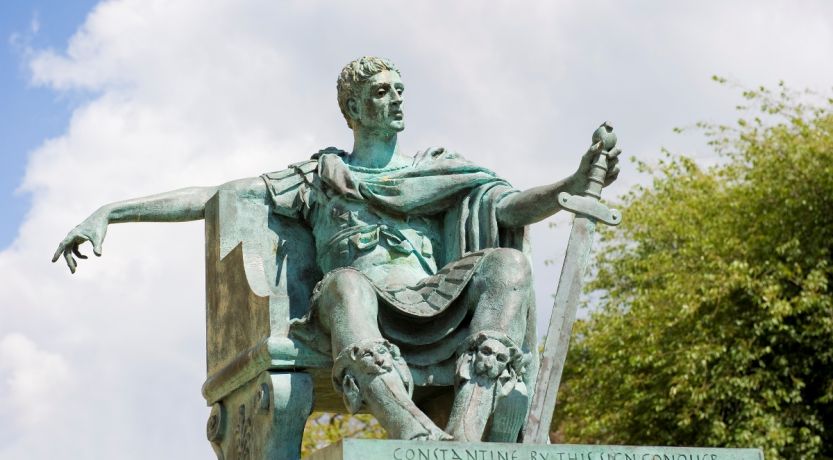One of the most profound episodes affecting Church history involved Emperor Constantine and his decrees against God’s laws. Yet the Church of God held fast.

Jesus Christ warned His followers, “Do not think that I came to bring peace on earth. I did not come to bring peace but a sword” (Matthew 10:34). His words have proven true throughout the centuries, and especially during the fourth century in the Roman Empire.
Another article on Church history discusses the loyalty of Polycarp and Polycrates in their defense of the New Testament Passover being kept on the 14th day of the first month of the Hebrew calendar. But persecutions continued against the Church. This article focuses on the decrees Constantine made regarding his interpretation of religious doctrine and the aftermath of his pronouncements.
Persecution toward the Church
In the years prior to Constantine, a number of Roman emperors had persecuted the Church Jesus established. One such campaign was sanctioned by Emperor Trajan after he received a letter from Pliny (A.D. 111-113). Pliny was a young lawyer and governor over the territory of Bithynia and Pontus, along the southern edge of the Black Sea where some in the Church had originally settled (1 Peter 1:1-2).
Following is a portion of Pliny’s letter:
“It is my practice, my lord, to refer to you all matters concerning which I am in doubt. For who can better give guidance to my hesitation or inform my ignorance? I have never participated in trials of Christians. I therefore do not know what offenses it is the practice to punish or investigate, and to what extent. …
“I have observed the following procedure: I interrogated these as to whether they were Christians; those who confessed I interrogated a second and a third time, threatening them with punishment; those who persisted I ordered executed. For I had no doubt that, whatever the nature of their creed, stubbornness and inflexible obstinacy surely deserve to be punished.”
Trajan responded: “You observed proper procedure, my dear Pliny, in sifting the cases of those who had been denounced to you as Christians. For it is not possible to lay down any general rule to serve as a kind of fixed standard. They are not to be sought out; if they are denounced and proved guilty, they are to be punished, with this reservation, that whoever denies that he is a Christian and really proves it—that is, by worshiping our gods—even though he was under suspicion in the past, shall obtain pardon through repentance.”
So, in the early part of the second century, we see persecution directed toward the Christians in the area of Asia Minor. This persecution continued, but the Church of God remained firm and loyal.
Persecution by Diocletian
Later, more persecutions took place. According to the historian Eusebius in his Ecclesiastical History (Book 8, chap. 2, paragraph 4), we read: “It was in the nineteenth year of the reign of Diocletian [A.D. 303], … when the feast of the Saviour’s passion was near at hand, that royal edicts were published everywhere, commanding that the churches be leveled to the ground and the Scriptures be destroyed by fire, and ordering that those who held places of honor be degraded, and that the household servants, if they persisted in the profession of Christianity, be deprived of freedom.”
Later, in chapter 5, we read about an unnamed man of zeal: “Immediately on the publication of the decree against the churches in Nicomedia, a certain man, not obscure but very highly honored with distinguished temporal dignities, moved with zeal toward God, and incited with ardent faith, seized the edict as it was posted openly and publicly, and tore it to pieces as a profane and impious thing; and this was done while two of the sovereigns were in the same city. … But this man … after distinguishing himself in such a manner suffered those things which were likely to follow such daring, and kept his spirit cheerful and undisturbed till death.”
So, there still existed faithful men despite the terrible persecution that ensued.
It is also interesting to note that one of those trained at the court of Diocletian, who was also present in Nicomedia during the persecution in A.D. 303, was Constantine. He eventually became a great general and, after many victories on the battlefield, was hailed by his troops as the next Augustus and later became emperor.
The reign of Constantine
In A.D. 312 Constantine invaded Italy to oust Emperor Maxentius, who had up to four times as many troops. Constantine claimed to have had a vision on the way to Rome, during the night before battle. In this dream he supposedly saw the Chi-Rho symbol, the first two letters of the Greek word for Christ, which some believed was a symbol of Christ, shining above the sun.
Seeing this as a divine sign, it is said that Constantine had his soldiers paint the symbol on their shields. Following this, Constantine went on to defeat the numerically stronger army of Maxentius at the Battle of the Milvian Bridge.
Religiously, Constantine was still a pagan who worshipped the gods of Rome, including the sun god. It wasn’t until much later, just before his death, that he supposedly converted to Christianity.
Religiously, Constantine was still a pagan who worshipped the gods of Rome, including the sun god. It wasn’t until much later, just before his death, that he supposedly converted to Christianity—a Christianity he had helped shape that was quite different from the Christianity of the early New Testament Church.
In one of his first major decisions as emperor, Constantine coissued the Edict of Milan in A.D. 313. It basically ended any further persecutions of the Christians. Even though the edict gave Christianity legal status, Christianity did not become the official religion of the Roman Empire until Emperor Theodosius I in A.D. 380.
In A.D. 314 Constantine summoned the bishops of the western provinces to Arelate (Arles) after a schism had split the Catholic Church in Africa. In his readiness to resolve this matter through peaceful debate, he also revealed a desire to insert himself into religious issues concerning doctrine.
The Council of Nicaea
One of the most famous gatherings over which Constantine presided was the Council of Nicaea in A.D. 325. Over 300 bishops of the Roman church convened to discuss a number of theological questions. One of the decisions reached was that Easter should be observed instead of the Passover.
According to the historian Theodoret (393-458), Constantine wrote: “It was, in the first place, declared improper to follow the custom of the Jews in the celebration of this holy festival, because, their hands having been stained with crime, the minds of these wretched men are necessarily blinded. By rejecting their custom, we establish and hand down to succeeding ages one which is more reasonable. …
“Let us, then, have nothing in common with the Jews, who are our adversaries. … Let us with one accord walk therein, my much-honoured brethren, studiously avoiding all contact with that evil way. They boast that without their instructions we should be unable to commemorate the festival properly. This is the highest pitch of absurdity. For how can they entertain right views on any point who, after having compassed the death of the Lord, being out of their minds, are guided not by sound reason, but by an unrestrained passion, wherever their innate madness carries them.”
So, here we see a complete reversal of a law of God (Leviticus 23:4-5; 1 Corinthians 11:23-25, 26, 27-28). One of God’s festivals was replaced by a pagan celebration.
Constantine went further: “To sum up in few words: By the unanimous judgment of all, it has been decided that the most holy festival of Easter should be everywhere celebrated on one and the same day, and it is not seemly that in so holy a thing there should be any division.”
A more ominous decision
However, four years before the Council of Nicaea, an even more profound and long-lasting decision was implemented by Constantine. And it went directly to the core of God’s laws.
In A.D. 321 Constantine decreed that Sunday would be observed as the Roman day of rest.
In A.D. 321 Constantine decreed that Sunday would be observed as the Roman day of rest: “On the venerable Day of the Sun let the magistrates and people residing in cities rest, and let all workshops be closed. In the country, however, persons engaged in agriculture may freely and lawfully continue their pursuits; because it often happens that another day is not so suitable for grain-sowing or vine-planting; lest by neglecting the proper moment for such operations the bounty of heaven should be lost” (Philip Schaff, History of the Christian Church, 1867, Vol. 2, p. 380, footnote 1.)
This decision had far-reaching effects. Not only was God’s law rejected, but people began to celebrate a pagan day (in honor of the sun god) instead of the seventh-day Sabbath, which is the true Sabbath day upon which humanity was to worship and honor God (Deuteronomy 5:12-14, 15).
Later, in A.D. 365, long after Constantine had died, an infamous declaration was made at the Council of Laodicea: “Christians must not judaize by resting on the Sabbath, but must work on that day, rather honouring the Lord’s Day; and, if they can, resting then as Christians. But if any shall be found to be judaizers, let them be anathema from Christ” (Council of Laodicea, 29th Canon).
Then, later in the early 400s, Augustine, one of the Roman Church’s theologians, proclaimed, “The holy doctors of the church have decreed that all the glory of the Jewish Sabbath is transferred to it [Sunday]. Let us therefore keep the Lord’s Day as the ancients were commanded to do the Sabbath” (Robert Cox, Sabbath Laws and Sabbath Duties, 1853, p. 284).
Looking for the church behind Life, Hope & Truth? See our “Who We Are” page.
The faithful held fast
As a result of these man-made edicts, a large portion of the world has been following false decrees, but not all people changed their beliefs to worship on Sunday. As persecutions over the Sabbath intensified, members of the Church of God migrated to the west, and history reveals that the Church thrived in the Balkans and Eastern Europe. But that is another story for another article.
In the meantime, take time to confirm what the Bible teaches about the seventh-day Sabbath. The following resources can help: “The Sabbath, Sunday, Every Day or No Day at All?” and “Which Day Is the Seventh Day?”





